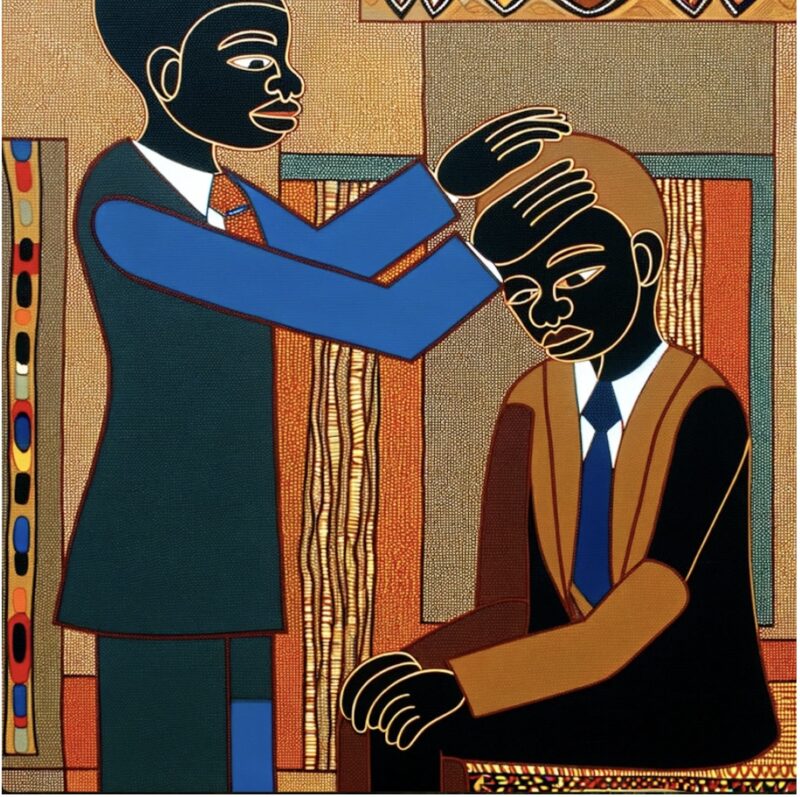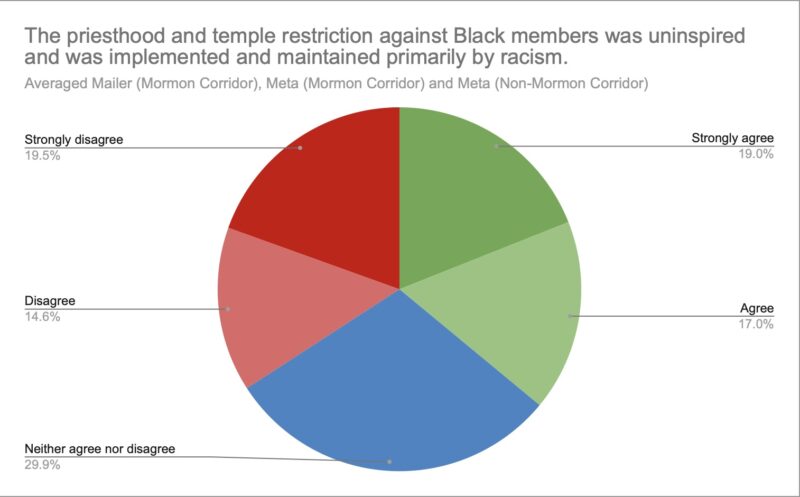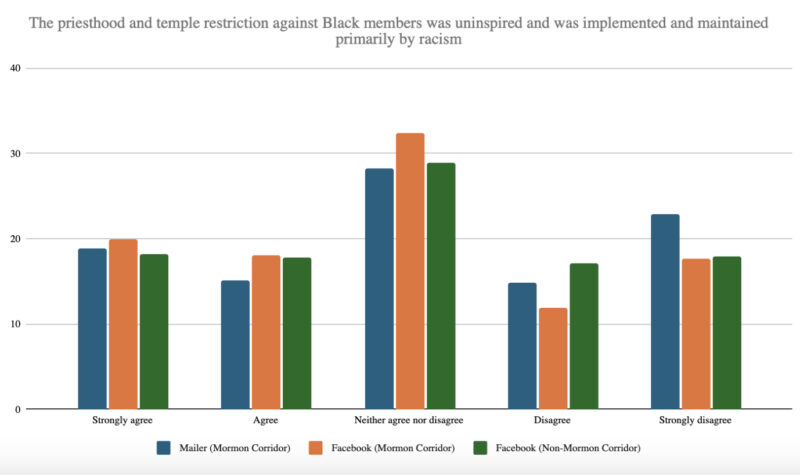
Black man ordaining another Black man in the style of African folk art
Stephen Cranney and Josh Coates
This is one of a series of posts discussing results from a recent survey of current and former Latter-day Saints conducted by the BH Roberts Foundation. The technical details are in the full methodology report here.
The provenance and maintenance of the priesthood and temple ban against Black Latter-day Saints is one of the more if not the most sensitive subjects in the modern Church. Of particular sensitivity is the question of whether the ban was inspired or not and, if not, why it took as long as it did to rescind it. Both David O. McKay and Harold B. Lee were reported to have sought revelation to remove the restriction, but were told that it was not time.
Although the Church published an essay in 2013 that condemned past and present racism and disavowed theories of the past, it did not make a statement as to whether or not the restriction was inspired by God.
We suspected that this question of the priesthood ban still divides the membership, with a lot of members on one side or the other. Because of its complexity, we could have asked myriad questions on race in the survey: how many members believe in the “Curse of Cain?” How many members think that Joseph Smith started the ban? How many members think that Black people were less valiant in the premortal existence?
Unfortunately, space on a survey is not unlimited, and the race and priesthood ban can be complex, so to capture a lot of these we included a question that we thought, while a little double barrel-ish, mapped onto basic perceptions about the ban.
The priesthood and temple restriction against Black members was uninspired and was implemented and maintained primarily by racism
So what did we find?
At a high level, it looks like about 1/3 of people disagree to some extent, 1/3 of people agree to some extent, and 1/3 of people choose the more ambiguous, don’t know, “neither agree nor disagree” option.


So our hypothesis that the Church is still largely split on this issue is born out. We suspect these numbers basically translate to: about the same number of people think that the ban was ordained by God as who think that the ban was because of racism, and about as many are agnostic about it one way or the other.

Comments
23 responses to “How Do Members Explain the Priesthood and Temple Ban?”
The double-barrel nature of the question strikes me as unfortunate. A plausible position that I would guess many members might hold would go like this: “The ban was not the product of revelation; it was a mistake, possibly the product of racism. And yet once the ban was in place, members and church leaders came to believe that it had been revealed, and that is why they continued to support it. They didn’t primarily support it because of racism.” Worded as it is, the question doesn’t seem to allow for that kind of position, and people who hold this view would accordingly be flummoxed in trying to respond.
How can the church not make a statement about past leaders being inspired or not but expect members to believe all the current leaders are inspired? I think they are lucky that the majority of orthodox members just follow along and dont question. My fav example is the mormon deal. The current leader is telling the members that the previous leaders were wrong or not inspired for spending millions on the “Meet the Mormon” and “I’m a Mormon” campaigns. He is basically saying they did “Victory for Satan” campaigns. The orthodox eat this up! If I use the word mormon in a church class, I get corrected and stoned! What? The last 16 church presidents didn’t seem to have a problem with the word mormon and the current one is saying they were all wrong and the orthodox members believe him. This actually scares me about the members on several levels.
How do members explain the priesthood ban? They dont have to, the church has to. If they dont, there is your sign.
If the church thinks the Mormon campaigns were wrong, then what else did our past leaders get wrong? Can we get an official list please? BTW I am still a believer, just not a orthodox one.
Recent talks on the subject have been pretty clear as well as the gospel topics essay. More work needed because this was clearly racism.
My grandparent’s generation, which is exactly President Nelson’s generation insisted they were not racist, but then turned around and said the most racist things. They freely used the “n” word, and were horrified that blacks might move into Utah county and lower property values as had happened in Salt Lake county. Yeah, they were not a bit racist. [end sarcasm]
I think many members of the church are still this way, they deny any racism while acting and talking racist. And I think this denial of any racism is part of the reason people are saying it had to be inspired because “we aren’t racist”, it is just that people from Africa are different than white people in all kinds of bad ways. It is still happening in places of the USA where the far right doesn’t want anything about slavery taught in school’s. The people insisting the CRT teaches that all white people are evil racists.
If people can get past their own denial, we are all racist. It is human nature to prefer things and people who are like us and familiar. And if you deny that fact and don’t fight against that tendency in yourself, you are just a bit more racist than the people who are willing to claim, yes, I am human and humans are racist and I am working on not being quite so racist.
So, of course the ban was racist. Let’s admit it and work on being less racist.
REC911,
I think the timing involved with letting go of the nickname “Mormon” may have had to do with crossing the line of negative returns. It might’ve been better to leave it in place for a time because of the world’s familiarity with it. But the world and the Kingdom are always in flux–and perhaps the time has come — especially in consideration of the church’s international growth — when it serves the purposes of the Kingdom better for the church to be identified by its real name.
Jack,
I might think the way you do if it were not for Nelson’s well known, life- long, disdain for the church being ok with mormon. The “timing” is that he is in charge and now can do what he has always wanted done. If you listen closely to talks by him or especially his current wife, he has had a “list” of things he wanted to change if he ever got a chance to change them. Clearly he has riffled through that list from day one at a break-neck speed to get through it before he dies and misses the opportunity.
Or you can take the orthodox view and believe that we finally have a prophet that is listening to God…
A group of people with every imperfection, including racism, comes together and slowly receives and practices the restored gospel of Jesus Christ. It is not surprising that some things take longer than others to perfect. Nor is it surprising that some improvements come as broader societal movements towards betterment. It is possible to lose faith by expecting too much of the Saints (should have improved sooner) and expecting too little of the Saints (all is well in Zion).
It is possible that racism maintained the ban not because the Lord enjoys our imperfections but because He had a sequence of things for us to work on, and extending priesthood and temple ordinances came in His timing. The Lord does not require us to perfect overnight. We still have a long ways to go.
*In 1830, a group of people…
I didn’t create the ban, have no idea why or how (along with everyone else), and rejoiced with the revelation it was over. Why grovel in the past?
sd,
Who is groveling?
I think a better word for what sd was trying to express is “wallow”.
sd –
Because per Dr. Phil (I think…?), the best predictor of future behavior is past behavior.
Or in more relevant terms… The best predictor of the validity of an ideal and the reputation of those that implemented the ideal going forward, are the longevity and results of ideals implemented by those people in the past.
sd wrote, “I didn’t create the ban, have no idea why or how (along with everyone else), and rejoiced with the revelation it was over. Why grovel in the past?”
It is false to claim that nobody can know why and how the priesthood ban came about. There is abundant scholarship on this point. This scholarship began more than fifty years ago. President Kimball had studied it when he concluded that the ban had to end. The body of knowledge about the history of the priesthood ban and the history of Mormon racism has only grown since then.
It is not possible to advance beyond what we were if we forget, delete, or ignore the knowledge of our past. Our past is the foundation of what we have become. The process of becoming better as a people requires strengthening our foundations—and sometimes that means digging up and repairing the weak spots.
There was a revelation, and many rejoiced. Do you think that ended the legacy of the priesthood ban? It did not. It was only a beginning, an opening of the possibility for change. The real work of change is and always has been up to all of us. Nobody but you can do your part. Every time someone turns their back on the past and denies the way it shapes our present, the work we have to do gets put off a little longer.
It was blatant racism, and if one couldn’t discern that, well that’s a real reflection upon personal beliefs and values. Our Faith is one that discourages enquiry. Easy to see why. I still attend church and enjoy doing so – but I’m no longer as orthodox as once was, and feel much better for it.
I can’t dismiss the counsel of ten consecutive prophets–who were some of the most loving human beings ever to walk the planet. That’s a bridge too far for me.
I think we should be able to look at obvious and unambiguous racism and call it racism. And amen to Loursat’s comment. To deny what happened is only to perpetuate the problem.
I think we’re looking at this through too narrow a lens. It’s kinda like allowing forensic evidence to determine the cause of death in a murder investigation–and leaving it at that. Yes, we’d know that the victim died of a gunshot wound–but what about the larger picture that involves the motivations and opportunities of the perpetrator? There’s a lot more to the story than just the immediate cause of death.
So too, when we’re dealing with something as sensitive and seemingly counterintuitive as the priesthood ban, it might serve us well to consider the larger world that the church inhabited in those days. The entire country was racist. The world that the church was a part of was dominated by a racist culture–that is, according to our modern sensibilities.
And so, when we say that the problem was racism pure and simple–well, yes, but not so simple. The world had to change — not just the church — before we could fully integrate our black brothers and sisters.
Jack,
With continuous revelation, you are going to have problems. I hope you have gotten over the end of plural marriage!
So we couldn’t follow the admonition of Jesus and love and respect our fellow human beings without the permission of society around us? The Quakers, many Congregationalist communities and the Salvation Army were accepting in the late 19th and early 20th centuries. Many Baptists and the Methodist Episcopal Church in the North were fervently abolitionist and evolved anti-racist policies by the time of the Civil Rights Movement. Yet during the same period (1865-1965) the LDS Church went backwards? Based on what revelation? Sorry, the cause wasn’t God, it was racism. Racism was a burden carried fully by Black members of the Church until 1978 and even beyond. It limited church growth. It is time we acknowledge that and repair the damage. Even if it makes some a little uncomfortable.
To Old Man’s point, the Reorganization (now Community of Christ) had a revelation in 1865 by Joseph Smith III that specifically confirmed that they should ordain black men – and that’s the branch of the Restoration that was often more worried about societal norms than our branch was at that time!
I think it would be interesting, if we had the data, to see how this is changing through time. It seems to me that members have been moving from the “disagree” group into the “agree” group for several years, but I have not seen any data to refute or corroborate that hypothesis.
A very enlightening survey! Thanks for sharing. I would love to these survey responses broken out by demographics.
Did your survey allow for break down along age categories? I suspect that the answer to this question skews very heavily based on race, with older members disagreeing and younger members agreeing.
*based on age (though, likely by race, as well)